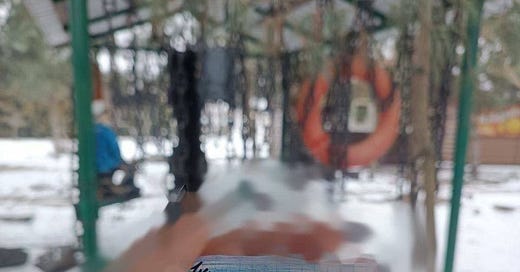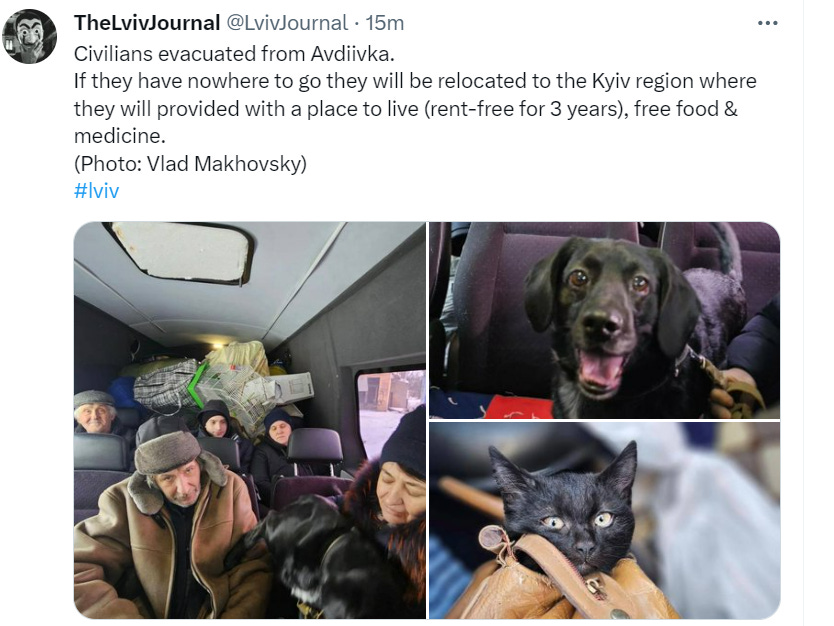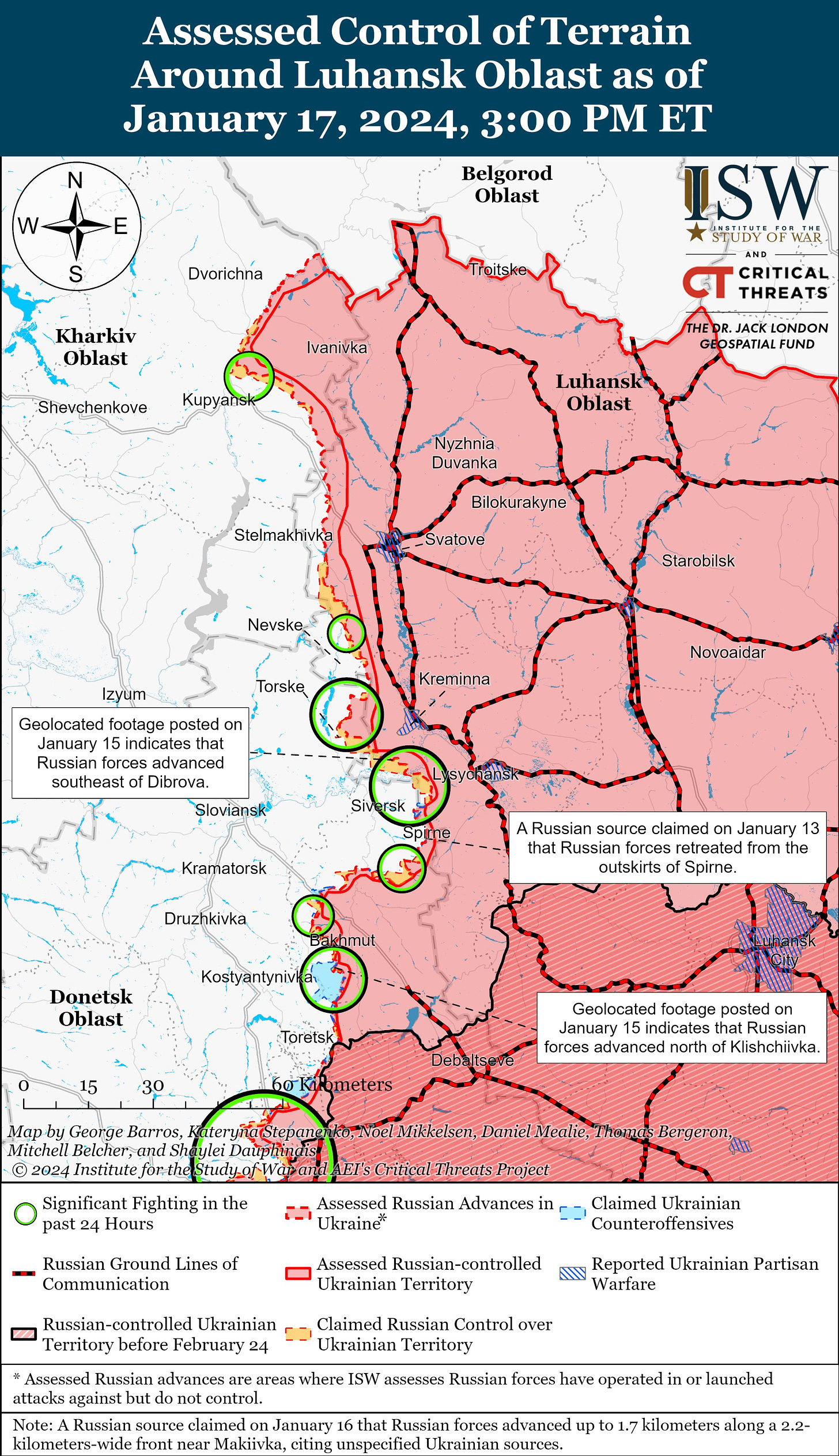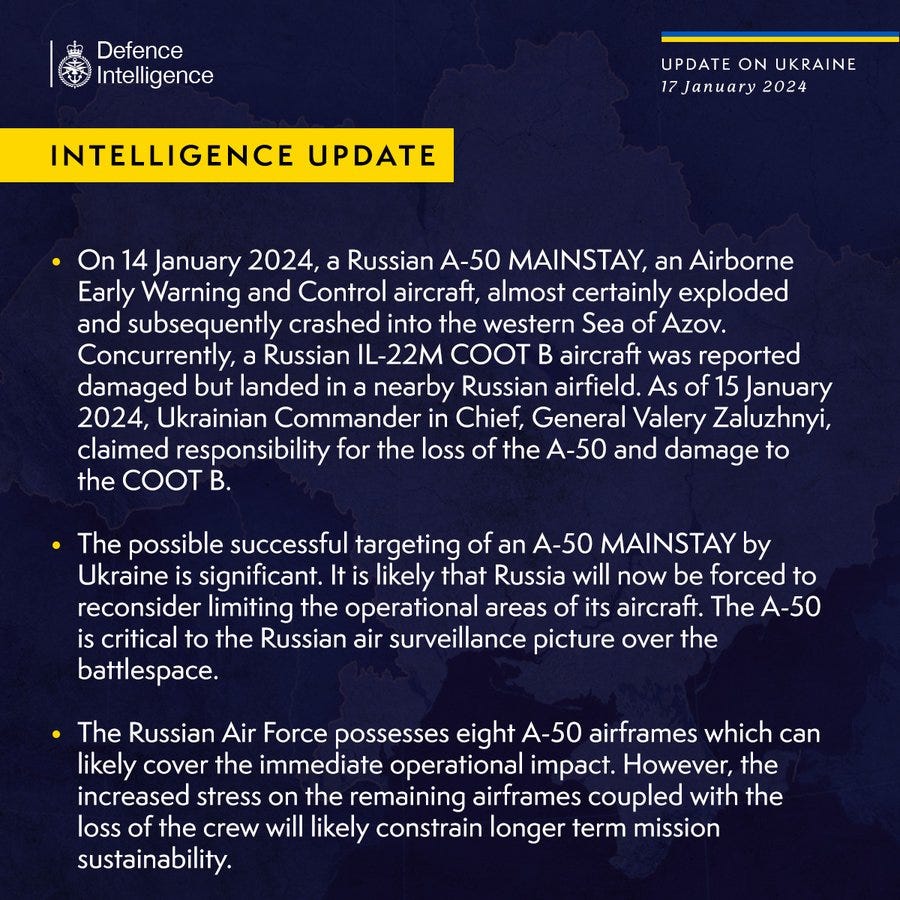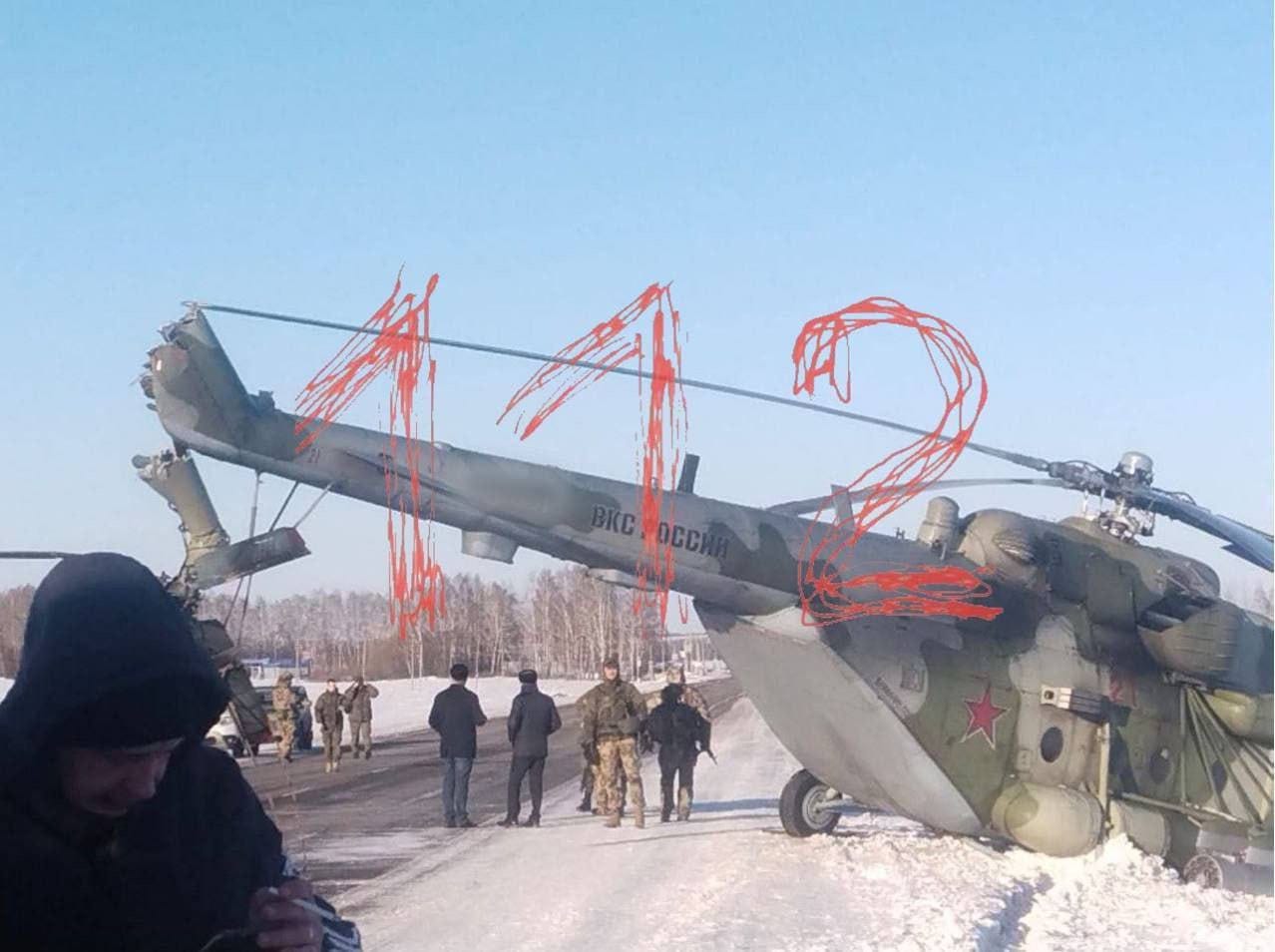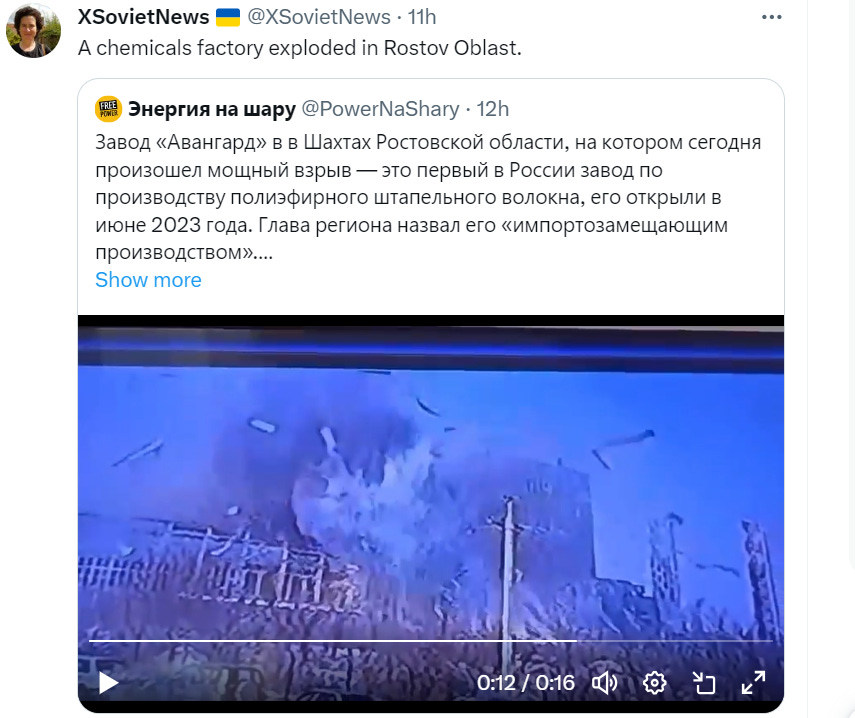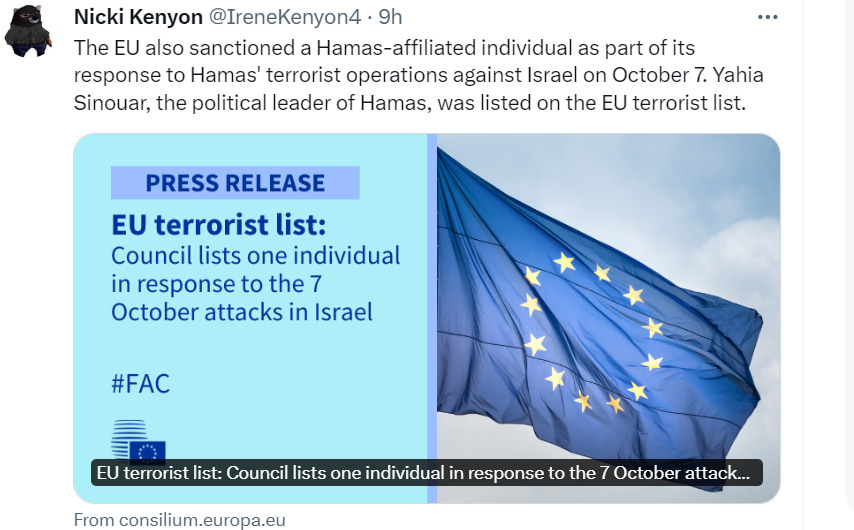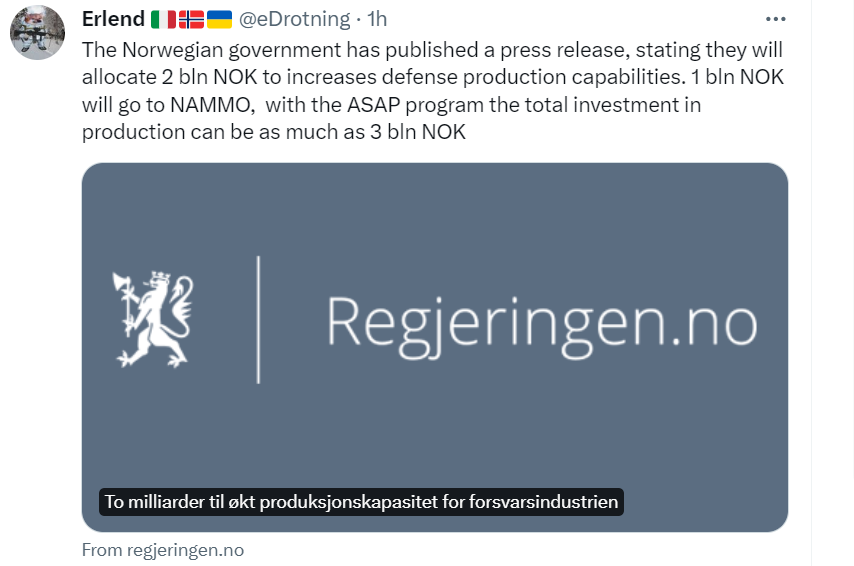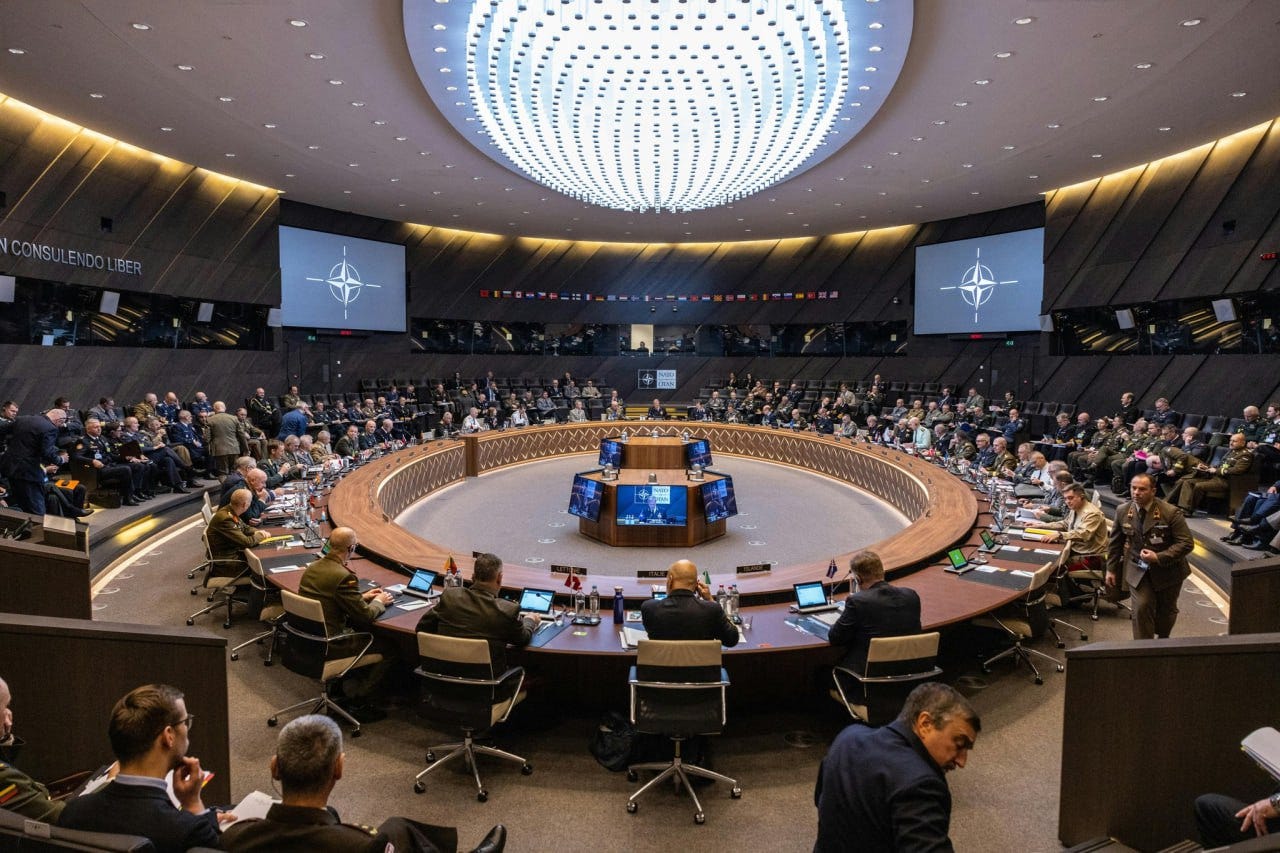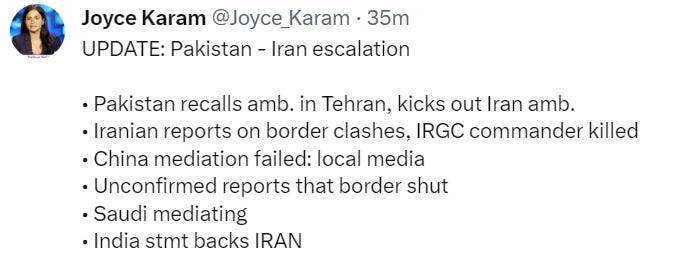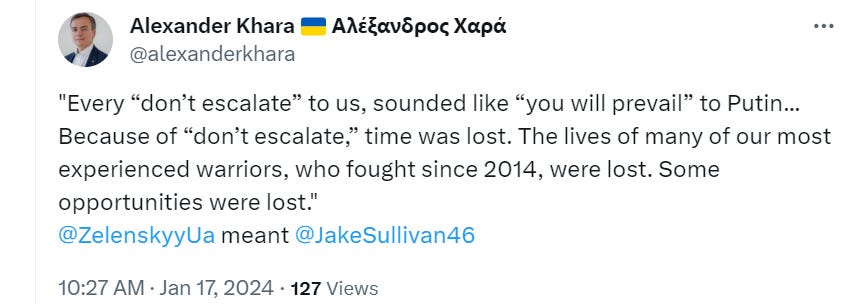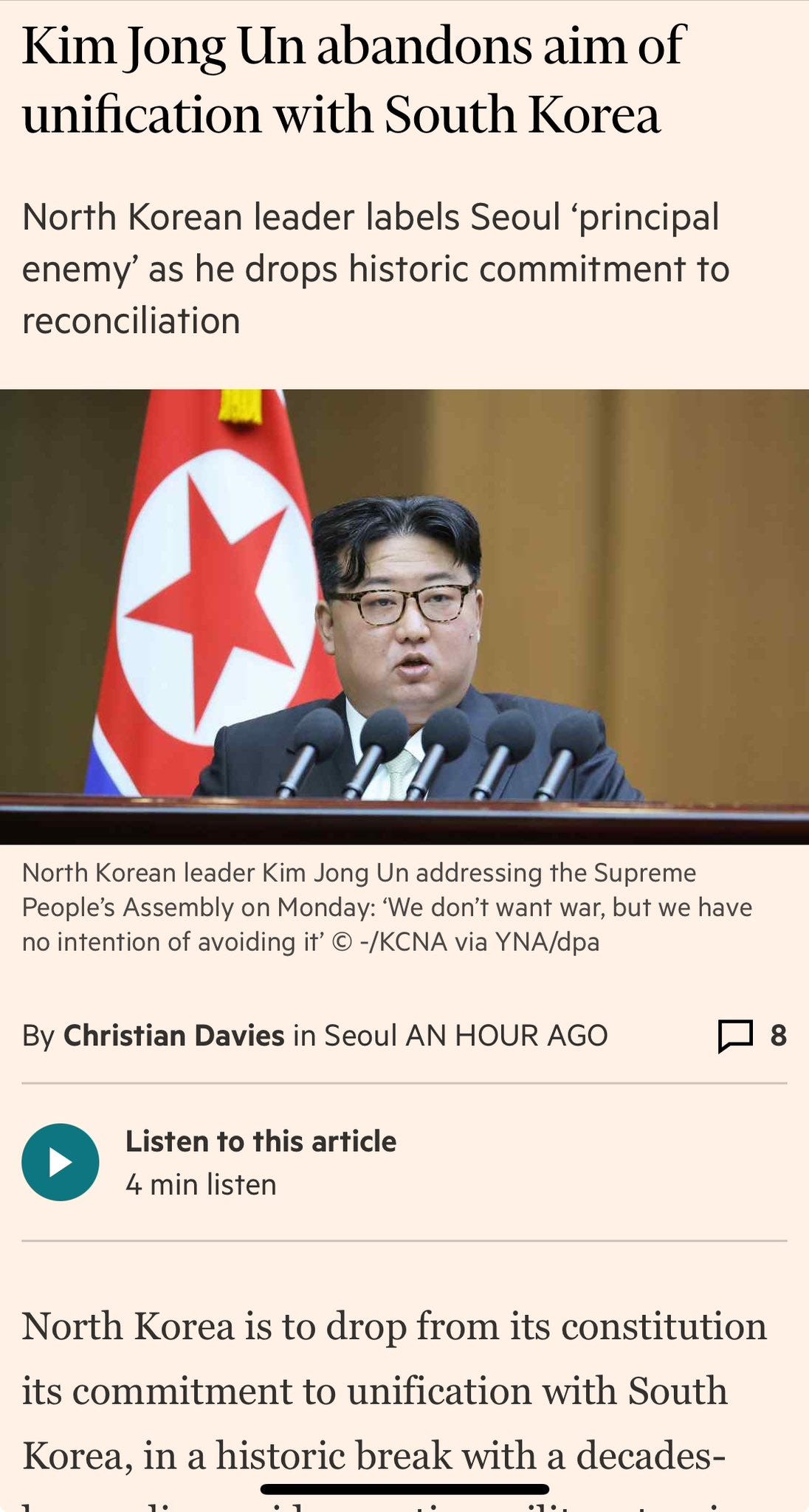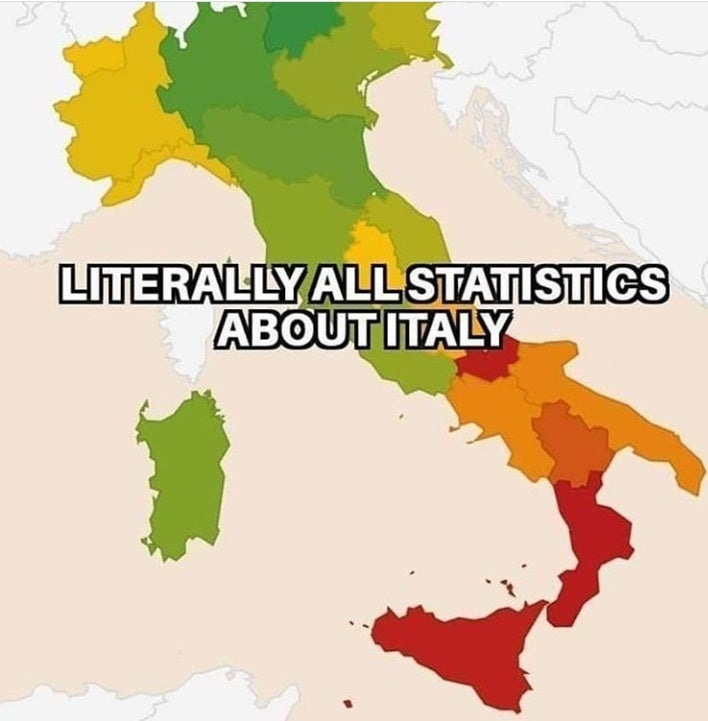Jan 18: E-Stories
Day693 Kherson Kharkiv CombatSit BehindLines BEL InRussia Allies DAVOS UA-NATO A&P LvivJourno ISW UKDef Nauditt Khara Scherba KyivIndie 112 NoelReport Rosenberg XSoviet Kenyon Fallon Erland Karam IWM
Catching up…
EA Worldview’s Ukraine Up-date- hop over to Scott’s amazing hourly Ukraine up-date page. I’ll fill in with some bits and bobs.
Stories we’re following…
Russian missile attack on downtown Kharkiv injures 17. Russian troops launched two strikes against Kharkiv, most likely using S-300 missiles, late on Jan. 16, injuring at least 17 people, Kharkiv Oblast Governor Oleh Syniehubov said.
Noel Report: The building that was hit by an S-300 missile in Kharkiv is a "defunct medical facility", the State Emergency Service reported.
One person has been killed and five people have been injured after Russian attacks on multiple villages in Kherson oblast, according to regional authorities. Its governor, Oleksandr Prokudin shared a video of the damage to the area and said that Russian forces fired at the area for an hour. He added that a three people were injured in Russian attacks against Beryslav and an 81-year-old woman was injured an attack on the village of Romashkove.
After a brief pause in kamikaze drone attacks, Russia once again launched shahed drones overnight: 19 out of 20 were shot down.
The Shakhty Polyester Plant in the Rostov region in Russia is on fire. Russian channels report that the plant, which was finished just recently at a total cost of ~5 billion Rubles, was attacked by Ukraine.
Speaker of the US House of Representatives Mike Johnson said that he does not intend to discuss with Biden the allocation of money to Ukraine until the issue with the southern border is resolved.
"We need to know that Ukraine will not become the next Afghanistan. And many Americans have a question why this continues without proper answers. But before we even start talking about Ukraine, I will tell the president - border, border, border. We must solve our own problems before we do anything else," Johnson said.
Combat Situation Update
On the 693rd day of the full-scale war, the General Staff of the Armed Forces of Ukraine reported on Facebook, information as of 06:00 on 17 January:
the Russian forces tried to breach the defence of the Ukrainian forces on the Lyman and Marinka fronts;
improve their positions on the Kupiansk and Avdiivka fronts;
attack on the Bakhmut and Shakhtarsk fronts;
assault the positions of the Armed Forces of Ukraine on the left bank of the Dnipro River in Kherson Oblast.
Russian tactical aviation operations are reportedly decreasing near the Sea of Azov. Russian aviation capabilities may be degraded after Ukrainian forces destroyed a Russian A-50 long-range radar detection aircraft and caused severe damage to a Russian Il-22 airborne command post aircraft on the night of January 14.
Pentagon: Next Ramstein-format summit to be held on Jan. 23. The announcement came after U.S. Defense Secretary Lloyd Austin and his counterpart Rustem Umerov talked on the phone on Jan. 16 about the upcoming summit and other battlefield updates.
Noel Report: Pro-Russian channel Romanov about the situation in Krynky, about which he is being told by Russian units fighting there. A summary:
assault units have no direct contact with recon and artillery units;
requests for fire support from the ground first go to the command, and then (if they are lucky) reach the artillery;
no systematic work of electronic (intelligence) warfare is organized.
There are also some other points on the designation of losses, namely, documentary forgery. The losses are recorded in such a way that they were allegedly not in Krynky.
In Novotroits'ke on the occupied left bank of the Kherson region, inhabitants are waiting for the Ukrainian forces.
In Russia, a Mi-8 helicopter made an emergency landing on the M3 highway in the Bryansk region after it hit a power line.
Behind the Lines
Ukraine amends conscription rules for military industry workers. The changes in the conscription rules for military industry workers are "aimed at strengthening the potential of the defense industry and enabling defense companies to operate steadily and increase production," said Deputy Economy Minister Ihor Fomenko.
Slovakia's parliament approved a change allowing the defense ministry to green-light arms exports, a shift from PM Fico's pledge not to send arms to Ukraine. Critics link this to profit motives which fueled concerns about conflicts of government interest.
Elisabeth Braw: Norway's Minister of Justice and Public Security, Emelie Enger Mehl, plans to ban malign influence. Specifically, cooperation with foreign intelligence agencies for the purpose of spreading malign influence is to be banned.
Norway is proposing pioneering action with a law that would ban cooperation with foreign countries’ intelligence agencies for the purpose of influencing public opinion at home. It’s a gutsy move by the Norwegians: proving contacts with hostile intelligence agencies is likely to be a tall order, but it’s far better than no action.
“We know that foreign countries are constantly using new methods to damage fundamental interests in Norway that have been difficult to protect society from,” the Minister of Justice and Emergency Preparedness, Emilie Enger Mehl, said on January 12.
She’s right. Especially since Russia and China became more assertive and contemptuous of other countries’ sovereignty about a decade ago. Since then, they’ve adroitly exploited Western societies’ openness for their own malign purposes.
Media: Money transfers from Russia to Turkey come to standstill. Turkish exporters have faced an almost complete halt of money transfers from their Russian clients since Jan. 1 as they were either returned or rejected by banks, which has led to serious disruptions in trade between the two countries, Turkish media outlet Ekonomim reported on Jan. 16, citing anonymous sources.
Mart Kuldkepp on the professor arrested by Estonia intelligence for working for the Russians:
“I'm really not impressed with the judgment of all these Western academics whose default stance seems to be that they *personally* couldn't possibly have been fooled by a Russian intelligence agency, so there must necessarily be some other explanation to what's happening.
They profess no confidence in Estonian counterintelligence, but can't explain why, or resort to chauvinist stereotyping. They also instinctively assume they themselves must be smarter than FSB/GRU/SVR, but also can't explain why that should be the case. Fact is: they aren't.”
Me: While most people wouldn’t pay much attention to the story about Viacheslav Morozov, a professor in International Political Theory at University of Tartu, who has been arrested by the Estonian Internal Security Service for espionage and aiding espionage against Estonia, it’s something to take seriously.
The Russian practice of recruiting amongst the intelligentsia in foreign universities or implanting agents, goes right back to the Soviet Union. Professors are perfect for collecting information because they are generally not in the public eye, they can travel, and they may get access to state institutions and sensitive information. They can also indirectly promote the Russian worldview to their students. They can be easily recruited by appealing to their need to feel important or in some cases, they accept money because of personal problems.
Russia and China seek to penetrate our institutions, and universities are not immune. I share Matt’s surprise that colleagues are so ready to blame the intelligence services and not the malign actors who are involved in these operations. Especially in Estonia, which the Kremlin considers to be the weak link in the EU in terms of security because it is an internet-based society. Estonian intelligence works hard to find malign actors.
Meanwhile in Russia
Deputy Chairman of the Security Council of the Russian Federation Dmitry Medvedev said that Russia will now always fight against Ukraine.
"There is a 100 percent probability of a new conflict, no matter what security papers the West signs with the puppet Kiev regime. It could happen in ten or fifty years," he mumbled.
Citing the need to guard against increased DDoS attacks on Russian state resources, the federal censor Roskomnadzor has drafted a plan to create a geolocation database of all the IP addresses in the country.
The agency wants to obtain users’ network addresses in addition to other personal data already supplied by website owners, network owners, and other “information distributors” like Vkontakte, Yandex, Mail.ru, and other popular online resources. The text of the draft project suggests that Roskomnadzor will block access to Russian state websites from abroad and via VPN.
Steve Rosenberg for the BBC—In today’s papers
“Turkish banks refusing to work with Russian banks”
“export price of Russian coal falling"
“China given control of Russia’s car market.”
“Russians losing interest in news & political TV shows”
In mid-December, the Moscow Health Department issued an order making it mandatory for medical clinics to keep audio recordings of patient visits. City officials said they had decided to implement the rule after conducting a “successful” pilot experiment in two Moscow clinics. Patients will not be allowed to opt out of being recorded. Each institution’s chief physician will choose some of these “depersonalized” audio recordings to be reviewed and evaluated by a specially trained employee.
State Duma committee chairman has petitioned Prime Minister Mikhail Mishustin to ban beer imports from countries on Russia’s “unfriendly nations” list. If adopted, the policy would block beer supplies from the U.S., the E.U., Canada, Australia, Norway, and many other countries. Lawmaker Alexey Didenko reasons that beer is as vital an export for Germany as apples are for Poland, but Russia blocks only the latter.
The dating app Tinder will stop working in Belarus beginning on February 15, its press service has announced. The app’s parent company, Match, did not provide an official reason for the departure. In May 2023, however, when the company announced Tinder would stop working in Russia, it cited human rights concerns.
“It’s not a good look for a trusted brand to be continuing operations in a nation where the head of state has been indicted by the International Criminal Court,” the executive director of one of Match’s shareholders told Reuters at the time.
Jurgen Nauditt—Chinese imports to Russia: The import list is staggering.
Key industrial items such as ball bearings - nothing moves without them - are up 3,000%. Let alone the indirect supplies sent via Central Asia.
China supplied 10,000 earth movers and diggers to Russia in 2022-23, along with 7,800 trucks. Most of those diggers and earth movers were used to build the defence lines Ukraine couldn’t break through.
Chinese microchip supplies rose by 1,000%.
China supplied radios, jamming equipment, aircraft spares, engine parts for fighters, ammunition manufacturing equipment and a vast array of ancillary equipment for the Russian army.
Furthermore China is supplying North Korea with the equipment it needs to boost shell production for supply to Russia. The DPRK is said to have increased shell production by 25% and is operating full 24 hour shifts in factories to meet targets.
Oleksandr Scherba: “Bashkortostan right now. One of the poor provinces of Russia. Of course, its governor is fully supportive of war and hateful of the "decadent" West. And of course, his daughter lives in Austria.”
Me: the riot is not about Russia’s war against Ukraine. It’s about a local politician who has been arrested.
Protesters in Baymak, a small town in Russia’s central Bashkortostan region, clashed with riot police on Wednesday after a court sentenced eco-activist and campaigner for the protection of the Bashkir language, Fail Alsynov, to four years in prison for “inciting hatred”. Police used teargas to disperse the protests, according to OVD-Info, which monitors protests across Russia. The head of the local interior ministry, Rafail Divayev, urged demonstrators to back down on and said: “I advise you to come to your senses and not ruin your life.”
Allied Support
Ukraine's Deputy Head of Military Intelligence, Skibitsky, warns that Russia is rapidly advancing its military capabilities, citing the evolution of Kh-101 cruise missiles. He emphasizes the need for Ukraine to enhance air defense and defense industry.
EU chief says aid package for Ukraine will be approved 'with or without' Hungary's approval. The EU will approve a 50 billion euro aid package for Ukraine 'with or without' Hungary's approval, EU President Ursula von der Leyen said in Davos on Jan. 16. "My personal priority is to have an agreement by 27. And if this is not possible, we are prepared for an agreement by 26."
Macron: France to deliver 40 SCALP missiles, 'hundreds of bombs' to Ukraine. French President Emmanuel Macron promised to deliver the weapons and also to personally visit Kyiv in February.
France's Minister of Defense, Sébastien Lecornu, emphasizes enduring military support for Ukraine amid Western aid fatigue. He reveals the production of 78 Caesar self propelled howitzers, a French artillery flagship, for Ukraine.
EU chief Ursula von der Leyen said she was “confident” of getting Hungary to drop its veto on a €50bn ($54bn) aid package for Ukraine at a crunch summit in two weeks, reports AFP.
The EU’s 27 leaders agreed to reconvene for a new meeting in Brussels on 1 February to try to hammer out a deal with Budapest on the aid and a broader update to the bloc’s budget. “I am confident that a solution at 27 is possible,” von der Leyen told the European parliament.
Zelensky held a meeting with the President of Poland Andrzej Duda in Davos.
"We discussed our bilateral relations, in particular, cooperation on the track of European integration of Ukraine. We coordinated our positions on the eve of the Washington NATO Summit. Informed about the situation on the battlefield. We discussed further defense support of our country."
Chancellor Olaf Scholz spoke to US President Joe Biden on the phone on January 16th. The topics of the conversation were continued support for Ukraine and the situation in the Middle East.
The Chancellor and the President agreed in condemning the continued Russian attack on Ukraine and the need to continue to support Ukraine financially, militarily and humanitarian. In 2024, Germany will support Ukraine with more than seven billion euros in military goods.
"Sweden does not exclude the provision of JAS39 Gripen aircraft to Ukraine, however, the adoption of such a decision is connected with Sweden's accession to NATO," Minister of Foreign Affairs of Sweden, Tobias Billström said on a sideline event in Davos.
Estonian Prime Minister Kaja Kallas suggests that member countries of the 'Ramstein group' should send the equivalent of 0,25% of their GDP to Ukraine annually. This could yield €120 billion that allows Ukraine to turn the tide on the battlefield.
Canada urges the U.S. to expedite the transfer of NASAMS anti-aircraft missile system to Ukraine, paid for in March 2023. Delays stem from the need for a U.S.-Ukraine agreement on arms sale abroad. Negotiations are still ongoing.
China refused to agree to a meeting between Prime Minister Li Qiang and President Zelenskyi in Switzerland. China’s decision not to meet with Ukrainians appeared intentional and not the result of a ‘scheduling’ problem.
Politico: Yielding to Chinese pressure, EU countries have refused to refer to the election as a presidential one [in Taiwan]— or even to name Lai — in their congratulatory messages, contrary to Washington, London, Tokyo, Canberra, Singapore and Manila.
From Paris to Berlin to Brussels: France congratulated “those elected” this weekend, calling for the “resumption of dialogue and cooperation” between Taipei and Beijing.
The German foreign office had a similar message: “We congratulate all voters, the candidates who took part in these elections and those elected.” The European External Action Service’s statement is the most timid of all, congratulating only the voters — and left out the candidates.
Secretary Anthony Blinken at DAVOS: Blinken is asked whether this is the worst time to be US secretary of state, or just in the top five.
Blinken argues, though, that the US is in a “renewed position of strength” under Joe Biden. He says Biden asked him to reengage with international partners, and that has happened. It means that when dealing with China, and Russia, the world has more convergence than before, he argues.
Asked if were anywhere near a ceasefire in Ukraine, Blinken says ‘I don’t think so’. He says Putin is prepared to keep putting his young men into a meat grinder war, which is a profound tragedy. But he can see a future where Ukraine stands strongly on its own two feet.
Britain’s foreign secretary, David Cameron is to meet his Ukrainian counterpart, Dmytro Kuleba. Ahead of the meeting, news agency PA, reports Cameron as saying:
The world has changed significantly since I first entered government, and we live in very unstable, uncertain and dangerous times. The global impact of conflicts, diseases and climate change is sadly growing. But as the challenges increase, so too must our efforts.
In my discussion with foreign minister Dmytro Kuleba, I will make clear the UK will continue to be a steadfast supporter of Ukraine, so it not only wins the war, but emerges from it as a strong, sovereign, and free country.
Ukraine is standing up for the rules that keep us all safe. This is why the UK has provided almost £12bn in support to Ukraine. We will stand with them for as long as it takes to achieve victory.”
"putin embodies war. We all know that he's the sole reason why various wars & conflicts persist, & why all attempts to restore peace have failed. And he will not change... His answer to the limits of chaos in the world is the boundless support of terrorist forces."
President Zelensky
Financial Times: Kim Jong Un abandons aim of unification with South Korea
“Kim told North Korea’s Supreme People’s Assembly on Monday that South Korea was his country’s “principal enemy” and its citizens should no longer be regarded as “fellow countrymen” as he ordered officials to close state agencies dedicated to unification and inter-Korean tourism.
“The expressions ‘northern half’ and ‘independent, peaceful unification, and great national unity’ in our constitution should now be deleted,” Kim said, according to state media.”
“The reality is that the North-South relationship is no longer a relationship of kinship or homogeneity, but a relationship of two hostile countries, a complete relationship of two belligerents in the midst of war,” he added.
He also called for the dismantling of an “eyesore” monument in Pyongyang that promotes inter-Korean unity.
Theresa Fallon comments on the article: In my worst case scenario, this is starting to feel more orchestrated than a series of unfortunate events. With EU support fatigue for Ukraine setting in along w/ delayed backfill for armaments, escalation in the Middle East, and now unusual declarations from North Korea.
Putin met w/ Kim Jong Un in Vladivostok on Sept 11, 2023. Whenever Putin meets w/ Xi, for example, bad things happen.
“The Korean states, which remain in a state of war after a 1953 armistice that halted hostilities, have both maintained an official commitment to reunification. But last month, Kim announced that his regime’s decades-old unification policy of “one nation, one state with two systems” was no longer realistic.”
Was this what tipped the balance?
"South Korea's 'indirect' provision of 155-mm artillery shells for Ukraine this year has made it a larger supplier of ammunition for the war-ravaged country than all European countries combined." via Washington Post.
From the account: Terrible Maps! This made me laugh out loud. Absoutely correct by the way.
Programming notes…
This is a superb lecture. My thanks to Madi Kapparov for giving me the heads up.

